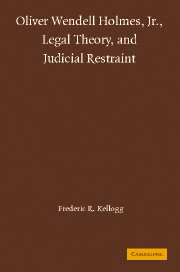Book contents
- Frontmatter
- Contents
- Preface
- 1 A Time for Law
- 2 Playing King: Connections and Misconceptions
- 3 Holmes's Conception of Law
- 4 Common Law Theory Revisited
- 5 Holmes and Legal Classification
- 6 The General Theory of Liability
- 7 Morals and Skepticism in Law
- 8 Judges, Principles, and Policy
- 9 Common Law Constitutionalism
- 10 Holmes's Theory in Retrospect
- 11 Conclusion
- Appendix
- Bibliography
- Index
10 - Holmes's Theory in Retrospect
Published online by Cambridge University Press: 24 July 2009
- Frontmatter
- Contents
- Preface
- 1 A Time for Law
- 2 Playing King: Connections and Misconceptions
- 3 Holmes's Conception of Law
- 4 Common Law Theory Revisited
- 5 Holmes and Legal Classification
- 6 The General Theory of Liability
- 7 Morals and Skepticism in Law
- 8 Judges, Principles, and Policy
- 9 Common Law Constitutionalism
- 10 Holmes's Theory in Retrospect
- 11 Conclusion
- Appendix
- Bibliography
- Index
Summary
Controversies over Holmes linger, seventy-four years since his death. In retrospect we gain insight into the work of an original thinker, but one may wonder how long the settlement of Holmes's reputation must take. Not quite a half century ago, Paul Freund remarked:
In England until recently it was a tradition that living authors were not to be cited as authority in judicial opinions. On one occasion the Lord Chief Justice, despite the tradition, could not refrain from citing Professor Holdsworth's History of English Law, but when he did so he was careful to refer to Professor Holdsworth as one “who is happily not an authority.” The reporter of decisions, in puzzling over this passage, concluded that it must have been a slip of the pen, and so when it was published it read “Professor Holdsworth who is unhappily not an authority.”
While among over two thousand opinions, in fifty years of judging, there are ample matters for which Holmes is happily, as well as unhappily, not an authority, I have bypassed much relevant criticism to suggest that contemporary legal and political theory has something to gain from a comprehensive reassessment. The Common Law has passed its 125th year, still widely misunderstood.
Much hinges on the turn Holmes's work took in 1876, examined in chapter 6, after his early critical scholarship had developed a deep skepticism of the project of analytical classification and an alternative rooted in common law.
- Type
- Chapter
- Information
- Oliver Wendell Holmes, Jr., Legal Theory, and Judicial Restraint , pp. 157 - 170Publisher: Cambridge University PressPrint publication year: 2006



